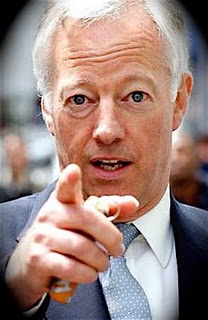
On December 10th (2005), word reached me that Mark THATCHER, errant son of former British Prime Minister Margaret THATCHER, had been spotted walking Monaco’s streets.
THATCHER had just copped a felony plea in South Africa (for participating in the planning of a coup d‘etat in Equatorial Guinea) and had been expelled from that country.
I had an immediate concern that THATCHER had chosen Monaco for his next home.
At my request, an officer from SIGER checked police files and confirmed it: THATCHER had officially become resident, on a carte temporaire,three months earlier.
Almost all residents buy or lease an apartment in Monaco as a condition of residency. The authorities do not generally recognize keeping a full-time suite in a hotel as satisfying this requirement.
Except for one loophole: the Fairmont Hotel inherited this quirk from Loews, Monaco’s first American-style hotel with casino, which Prince Rainier and Princess Grace lured to the principality in 1975.
Crafty THATCHER had identified this loophole, perhaps on advice from his Monaco lawyer, Donald MANASSE.
I dispatched a SIGER officer to the Fairmont to confirm THATCHER’s status. Indeed, he had taken a monthly contract.
This was excellent news.
Why?
I now had the ideal person with whom to make an example as part of Operation Scribe, which we created with Albert’s authorization to get the word out that the Prince meant business about cracking down on undesirables.
Mark THATCHER was universally disliked as a spoiled, arrogant exploiter of his mother’s name. He had made millions of pounds through dubious deals, including the one that got him chucked out of South Africa--and he scrupulously avoided paying tax to the UK.
I contacted an old friend, the political editor of the (UK) The People, which, on December 18th, published THATCH YER LOT--Monaco move is at risk.
That afternoon, I reached the Prince by phone and briefed him on the THATCHER situation, having determined through further investigation that Thatcher’s newest associate was, allegedly, Ivan TODOROV, a Bulgarian with strong links to Bulgarian organized crime groups.
TODOROV was already on my radar screen for other reasons, including wining and dining Bulgarian politicians aboard yachts berthed in Monaco’s harbor. It was suspected that THATCHER and TODOROV had embarked in an enterprise to smuggle and peddle conflict diamonds from Africa, using Monaco as their base through THATCHER's new residency.
I recommended the Prince take speedy action to expel THATCHER before other media descended upon the principality to ask how THATCHER could possibly gain residency status only two months after the Prince announced a ban on scummy people with dirty money.
Next day, the Prince summoned the interior minister to the Palace and determined that the person responsible for issuing the residency permit was Didier GAMERDINGER, deputy interior minister.
The minister agreed that “a mistake” had been made, and returned to his ministry--tail between his cheeks--to commence the expulsion process, which took the form of, your card temporaire will not be renewed.
The Prince switched gears, telling me he was “losing sleep” over the Philippe NARMINO, feeling pressure to appoint him chief of judicial services.
Again, I urged the Prince to resist such pressure. “SIGER will not feel safe investigating criminal activities if the head of justice is one of Monaco’s biggest criminals,” I cautioned. “You’ve got to avoid cronyism, or even the perception of cronyism. At least wait for the report.”
Next night, late, December 19th, I received a phone call from Jean-Luc ALLAVENA (JLA) and scribbled this notation into my journal:
D-Day tomorrow [Narmino decision]. A2 must make decision before 2:30 p.m. A2 worried about political fall-out from not appointing a Monegasque on the heels of new treaty with France.
JLA pointed out that Prince Rainier had tried to orchestrate these appointments (Franck BIANCHERI as chief of staff, NARMINO as chief of judicial services) before his death.
I believed it was Rainier’s chef de cabinet, Raymond BIANCHERI, who choreographed this while Rainier was seriously ill. (Several times, Rainier told his confidantes, “I’m too ill to rule any more,” and they said, “No, no, no—your son is not ready yet.” What they actually meant was, they were not ready yet.)
I said to JLA, “Rainier is gone, Albert is the Sovereign Prince. He has to make the tough decisions, it goes with the territory, even at the risk of losing friends.”
The following day, Philippe NARMINO appeared at JLA’s office expecting to be handed the job he coveted as head of justice. Instead, JLA grilled him. Narmino admitted nothing, denied all. The Prince put off making a decision.
JLA had also checked with the external affairs ministry for their file on Igor YOURGENS, the Russian supposedly appointed Monaco’s Consul to Moscow.
The ministry had nothing on file about YOURGENS. Not a copy of his passport, not a curriculum vitae, no address, nothing. No one knew who had appointed YOURGENS, who had recommended him, what his credentials were or even how to contact him.
Certainly, no one had vetted YOURGENS’ suitability for this honor.
That was now left for me to do.